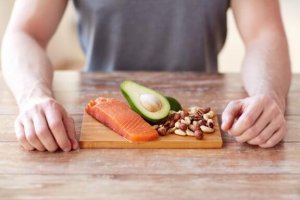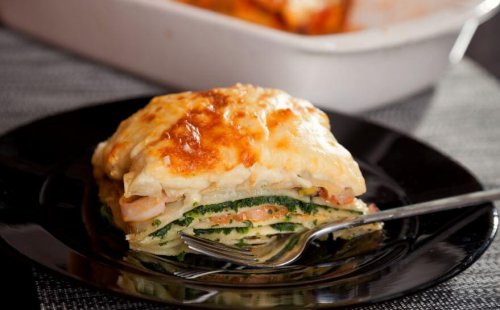The Diet of a Professional Athlete

Professional athletes train their bodies to the maximum to achieve the best results and surpass themselves each day. That’s why their nutritional plans can’t be the same as anyone else’s. Up next, we’ll explain the diet of a professional athlete.
A greater degree of exhaustion, nutrient consumption, and effort require a specific diet that’s only suitable for these types of people. This is often combined with the intake of sports supplements and, of course, a good resting routine.
Before getting started, it’s important to emphasize that these are just some basic guidelines that every professional athlete should follow. In any case, we must consider that, depending on the activity that each athlete practices, it’s preferable to choose some nutrients over others.
If you’re a professional athlete and you need a specific diet plan, it’s advisable to consult a professional in addition to following these guidelines. A nutritionist can create a plan specifically designed for you and the sport that you practice. It’s the best way to get top results.
That said, we won’t make you wait any longer. Let’s start analyzing the characteristics of a professional athlete’s diet. Additionally, we’ll explain which foods shouldn’t be missing.
Nutritional characteristics in the diet of a professional athlete
Given the high degree of fatigue to which professional athletes expose themselves to, they need to follow a satiating, and complete diet. The first thing you should keep in mind is that you have to regularly ingest nutrients in doses, eating at least five meals throughout the day. This is the best way to get enough energy and vitality all day long and thus, be able to make the necessary efforts.
To have enough energy, it’s best to consume whole grains in at least two of the meals you consume each day. This is very simple since you can consume this food in the form of bread, rice, or pasta.
On the other hand, protein is essential for any professional athlete. A good way to ingest this nutrient is through white fish and low-fat meats. Some examples of these foods are turkey meat or chicken breast; in regard to fish, monkfish or hake are good options.

Despite the bad reputation they have, fats are as essential as any other nutrient. Professional athletes must always choose the healthiest, such as the ones contained in oily fish, nuts, or olive oil.
Considering that there’s no other way, we have to accompany these foods with sufficient amounts of water. The amount of water you drink shouldn’t be less than two liters per day.
Supplements in the diet of a professional athlete
We must also bear in mind that the effort made by many professional athletes, requires a large number of nutrients. This quantity is sometimes so high that they can hardly obtain them through food alone, no matter how much they eat.
This is when food supplements come into play. The most popular ones are protein shakes, but there are many more, depending on the format and objective.
Before you start consuming a nutritional supplement, we recommend that you always consult a professional first. Moreover, you must buy them in a specialized store, which guarantees that the product is of good quality.
Essential foods
Now that you know what the diet of an elite athlete should contain, we’ll explain more about the essential elements. Up next, we’ll review which foods are basic and the reason why they cannot be lacking:
- Salmon: has 25 percent protein, it’s rich in omega-3, and also contains high-quality vitamins and minerals. Besides that, it cooks easily and has a spectacular flavor, hence, it’s a must in the fridge.

- Qunioa: contains 23 percent protein, it’s rich in essential acids, and has a considerable amount of minerals and vitamins. Additionally, quinoa is easily prepared and serves to accompany salads and combines well with vegetables.
- Banana: it has a high content of potassium and carbohydrates. Everyone loves it because, in addition to having a large number of properties, it’s easy to transport and preserve.
In conclusion, the diet of a professional athlete is as important as the training itself. Elite athletes don’t neglect this aspect of their preparation. Create your food plan to complement your activities!
Professional athletes train their bodies to the maximum to achieve the best results and surpass themselves each day. That’s why their nutritional plans can’t be the same as anyone else’s. Up next, we’ll explain the diet of a professional athlete.
A greater degree of exhaustion, nutrient consumption, and effort require a specific diet that’s only suitable for these types of people. This is often combined with the intake of sports supplements and, of course, a good resting routine.
Before getting started, it’s important to emphasize that these are just some basic guidelines that every professional athlete should follow. In any case, we must consider that, depending on the activity that each athlete practices, it’s preferable to choose some nutrients over others.
If you’re a professional athlete and you need a specific diet plan, it’s advisable to consult a professional in addition to following these guidelines. A nutritionist can create a plan specifically designed for you and the sport that you practice. It’s the best way to get top results.
That said, we won’t make you wait any longer. Let’s start analyzing the characteristics of a professional athlete’s diet. Additionally, we’ll explain which foods shouldn’t be missing.
Nutritional characteristics in the diet of a professional athlete
Given the high degree of fatigue to which professional athletes expose themselves to, they need to follow a satiating, and complete diet. The first thing you should keep in mind is that you have to regularly ingest nutrients in doses, eating at least five meals throughout the day. This is the best way to get enough energy and vitality all day long and thus, be able to make the necessary efforts.
To have enough energy, it’s best to consume whole grains in at least two of the meals you consume each day. This is very simple since you can consume this food in the form of bread, rice, or pasta.
On the other hand, protein is essential for any professional athlete. A good way to ingest this nutrient is through white fish and low-fat meats. Some examples of these foods are turkey meat or chicken breast; in regard to fish, monkfish or hake are good options.

Despite the bad reputation they have, fats are as essential as any other nutrient. Professional athletes must always choose the healthiest, such as the ones contained in oily fish, nuts, or olive oil.
Considering that there’s no other way, we have to accompany these foods with sufficient amounts of water. The amount of water you drink shouldn’t be less than two liters per day.
Supplements in the diet of a professional athlete
We must also bear in mind that the effort made by many professional athletes, requires a large number of nutrients. This quantity is sometimes so high that they can hardly obtain them through food alone, no matter how much they eat.
This is when food supplements come into play. The most popular ones are protein shakes, but there are many more, depending on the format and objective.
Before you start consuming a nutritional supplement, we recommend that you always consult a professional first. Moreover, you must buy them in a specialized store, which guarantees that the product is of good quality.
Essential foods
Now that you know what the diet of an elite athlete should contain, we’ll explain more about the essential elements. Up next, we’ll review which foods are basic and the reason why they cannot be lacking:
- Salmon: has 25 percent protein, it’s rich in omega-3, and also contains high-quality vitamins and minerals. Besides that, it cooks easily and has a spectacular flavor, hence, it’s a must in the fridge.

- Qunioa: contains 23 percent protein, it’s rich in essential acids, and has a considerable amount of minerals and vitamins. Additionally, quinoa is easily prepared and serves to accompany salads and combines well with vegetables.
- Banana: it has a high content of potassium and carbohydrates. Everyone loves it because, in addition to having a large number of properties, it’s easy to transport and preserve.
In conclusion, the diet of a professional athlete is as important as the training itself. Elite athletes don’t neglect this aspect of their preparation. Create your food plan to complement your activities!
All cited sources were thoroughly reviewed by our team to ensure their quality, reliability, currency, and validity. The bibliography of this article was considered reliable and of academic or scientific accuracy.
- Villegas García, J. A., & Zamora Navarro, S. (1991). Necesidades nutricionales en deportistas. Archivos de Medicina Del Deporte Revisión, 8, 169–179. Retrieved from http://femede.es/documentos/Necesidades_nutricionales_169_30.pdf
- Tur, J., & Pons, A. (2006). Nutrición y Deporte. In Masson-Elsevier (Ed.), Nutrición y Salud Pública(Vol. 36, pp. 337–346). Retrieved from http://cvapp.uoc.edu/autors/MostraPDFMaterialAction.do?id=168663
- del Castillo, V. (1995). La alimentacion del deportista. In Salud, Ejercicio Físico y Deporte(pp. 5–8). Retrieved from http://www.federemoycanotaje.org/media/9404/la alimentación del deportista.pdf
This text is provided for informational purposes only and does not replace consultation with a professional. If in doubt, consult your specialist.








